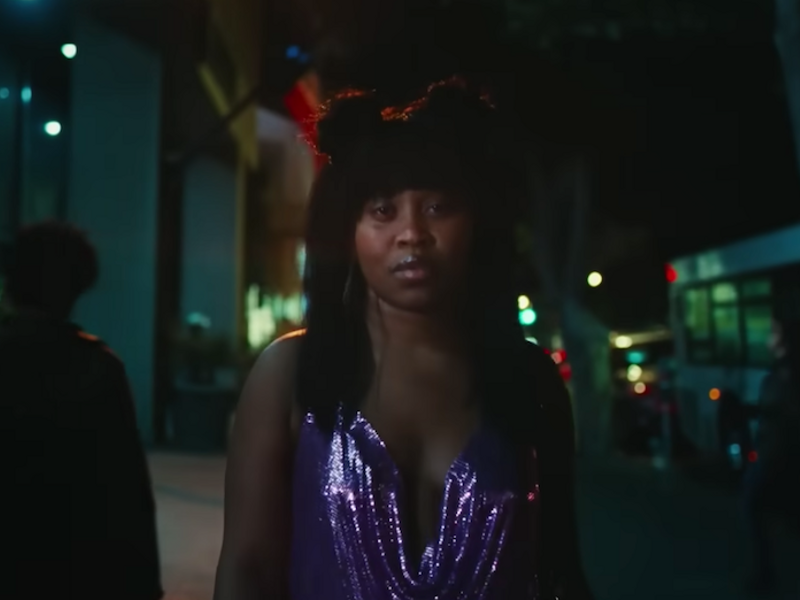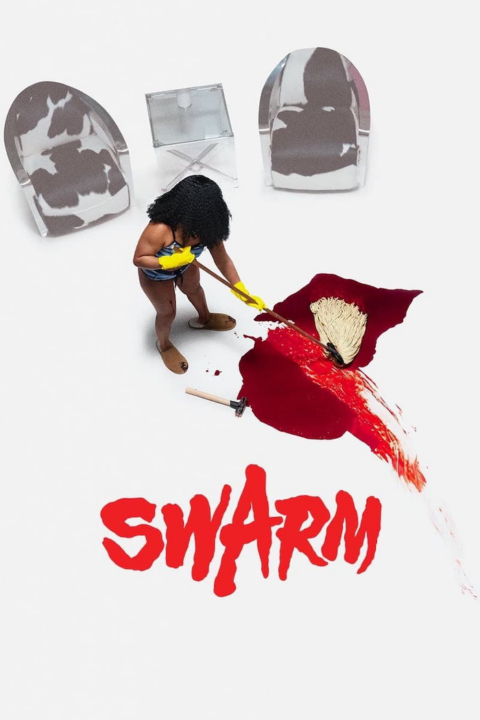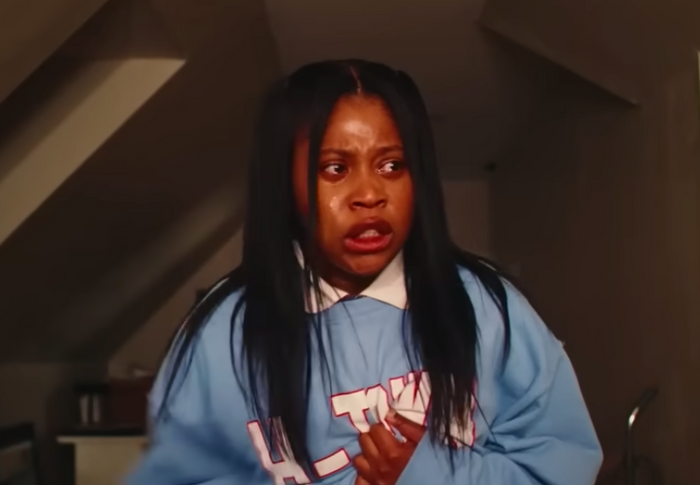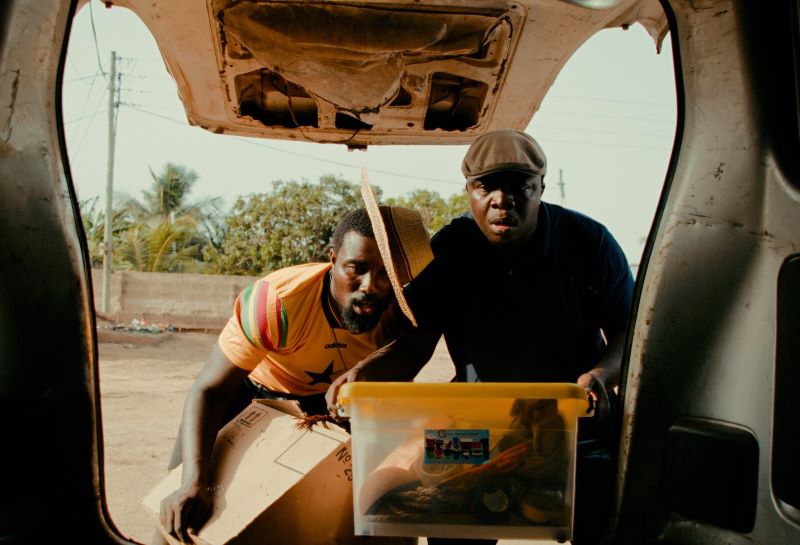
Still from Swarm. Source: Youtube | Amazon
Swarm, a new show from Janine Nabers and Donald Glover, exposes the very real dangers of obsessive fandoms. Each episode begins with a series of title cards that let the audience know that “this is not a work of fiction. Any similarity to actual persons, living or dead, or actual events, is intentional.”
A horror-comedy, the show depicts a young Black woman, Andrea “Dre” Greene (Dominique Fishback), as a superfan of fictional pop star Ni’Jah (blatantly based on Beyonce) and obsessive member of her online fandom, the Swarm (Beyoncé’s is called the BeyHive). Dre falls deeper into her obsession after the death of her foster sister and roommate, Marissa (Chloe Bailey), which sends Dre on a two-year murderous rampage to “defend” Ni’Jah.
Shows about obsessive fans aren’t new, but Swarm is the first to take this concept and centre Black womanhood and contemporary Black popular fan culture.
Online fandoms have arguably become more extreme since the 2010s, when social media changed how we interact with celebrities, allowing people to form intimate but one-sided connections called “parasocial relationships”.
This article is part of Quarter Life, a series about issues affecting those of us in our twenties and thirties. From the challenges of beginning a career and taking care of our mental health, to the excitement of starting a family, adopting a pet or just making friends as an adult. The articles in this series explore the questions and bring answers as we navigate this turbulent period of life.
Fans who display obsessive, dangerous behaviour are called “stans”. The name came from the 2000 Eminem song that portrays stalker fan, Stan, who, failing to get a reply to his fan letters, kills himself and his girlfriend.
The term “stan” has evolved to describe a fan with an unreasonable obsession that is not inherently dangerous and more people are using it to describe themselves. Swarm, however, does explore the darkest side of this culture and how, for some people, being a stan can be an emotional blanket under which deeper issues lie.

Image: Promotional poster for Swarm. Source: Fair Use
When a fan becomes a ‘stan’
Most fans are not pathological or extreme, but for some social media users hate has more power than pure devotion. As such, it’s become a common occurrence for fans to show support for the people they idolise by attacking anyone who might be seen as criticising them.
Incidents like this have been seen many times in the Beyhive. For instance in 2019, Beyhive stans levelled death threats at Nicole Curran, wife of Golden State Warriors basketball team owner Joe Lacob, for leaning over Beyoncé to talk to the singer’s husband, Jay-Z. In response, Beyoncé’s publicist posted a message on Instagram asking that the fanbase not “spew hate” in the name of their idol.
This is a real-life example that Swarm dramatises, with the “offending” party suffering a grisly end as Dre “defends” Ni’Jah. In these hyperbolic representations, Swarm forces audiences to think about how we interact with the artists we love.
Ni’Jah does not drink or do drugs. Her addiction, however, is to Ni’Jah and the way she makes her feel. That feeling is of belonging.
In a pivotal scene, Dre manages to get into the VIP section of a club where Ni’Jah is. She picks up a plum as she ogles the artist dancing.
In a close-up shot, we see her grotesquely devour the fruit. This is intercut with a shot of her teeth moving closer to something. This dream-like sequence is abruptly ended, as the closeup cuts to a standard full shot, and we learn that Dre bit Ni’Jah’s face.
Again, Nabers and Glover have taken a real rumour about Beyoncé being bitten and turned it into a critique of our sometimes dangerous treatment of celebrities. Her consumption of the plum is unsettling and greedy. Nothing else exists in that moment or matters. She has lost total control. Reality has given way to fantasy and Ni’Jah becomes the plum to Dre.
Biting may be extreme, but it isn’t far off from fans’ attempts to grope their favourite artists as if they are a piece of fruit or a doll.
Clinical researchers Randy and Lori Sansone have developed what they call the “number one fan” phenomenon. Their research has found that celebrity worshippers are more likely to have poor mental health and exhibit symptoms of anxiety, addictive behaviour and depression. Throughout the series, we can see a lot of this in Dre, for whom the fantasy of Ni’Jah makes her feel alive and not repressed.

Still from Swarm. Source: Youtube | Amazon
Uncomfortable black representations
It would be a shame to dismiss the series as a shallow portrayal of extreme fandom, as some critics have. Swarm is a satire of the darker elements of fandom but also a meditation on Black characters and Black popular culture.
The character of Dre, in particular, has made a few uncomfortable. As one Twitter user put it: “R we supposed to like Dre? Root for her? Or hate her?” She went on to name other serial killer characters from popular shows who she liked, including (the fictionalised) Jeffrey Dahmer and Dexter, stressing she wasn’t sure she could like Dre.
I don’t blame this viewer because characters like Dre are extremely rare on TV. When was the last time you saw a Black queer female serial killer as opposed to a white male one?
The show’s representation of stans is purposefully dark and offers a Black female perspective. Co-creator Donald Glover said that the idea for the show was inspired by a tweet from a Black woman complaining about the trope of the very put-together Black woman who is neat and successful. This tweeter wished, instead, to see grittier depictions of Black women.
Dre is the opposite of put together. She is a murderer, user of people, emotionally stunted and fiscally irresponsible. She’s falling apart and actively destructive as she embraces fantasy to escape trauma. Being uncomfortable is the point.
When we limit “good” representation only to portrayals that uplift Black people, we do a disservice to all the Black creators who want to sink their teeth into the complex humanity of our Blackness. This includes the darker parts that we would prefer to hide from a general audience.





